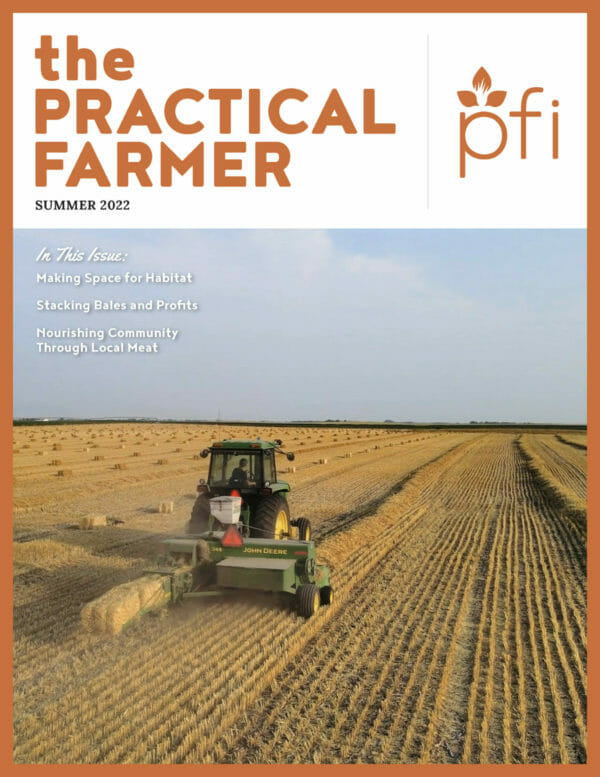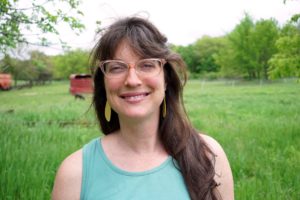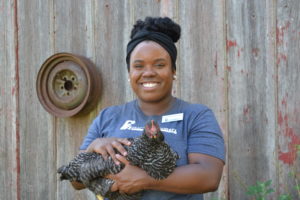the Practical Farmer: Summer 2022
Executive Director Note
From Adversity to Opportunity With the Help of Friends
Habitat
Heath Stolee has found ways to integrate wetlands, buffers and other on-farm habitat while staying profitable.
Small grains
Selling wheat straw, Angela Knuth and her family have found a steady stream of income in a volatile commodity market.
Livestock
A Vision for Regenerative Iowa-Based Meat
99 Counties offers a new market for regenerative, humanely raised livestock.
Horticulture
Winter spinach offers a bounty of rewards: outstanding flavor, market potential and opportunities for farmers.
Local Food
Consuming Locally Through PFI’s Directories
PFI’s online directories exist to connect consumers with products and services from members.
PFI Leaders
Thanks to the support of many, PFI has expanded program offerings to serve more farmers.
Beginning Farmers
Nourishing Community Through Local Meat
Some farmers are finding success connecting with customers and selling meat directly.
Commitment to Inclusivity
Practical Farmers has actively sought out a greater diversity of members these past few years, in response to member feedback and board leadership.
Member Book Review
“The Forager Chef’s Book of Flora” – Reviewed by Ben Hoksch
Review of: “The Forager Chef’s Book of Flora” by Minnesota Chef Alan Bergo
PFI News
Welcome Our Newest Staff Members
Additions to our farmer-led education and farm viability teams
Amos Johnson – Livestock Education Coordinator 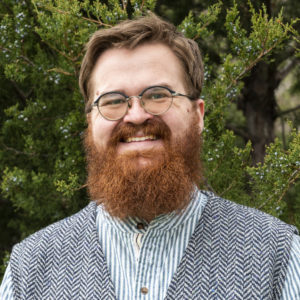
Amos Johnson joined Practical Farmers of Iowa as the livestock education coordinator in May 2022. He engages with farmers to create livestock-focused farmer-led events, writes for PFI’s various publications and works to connect livestock producers with the educational resources they need.
Attending Gustavus Adolphus College, Amos majored in the humanities-focused Environmental Studies program. While in school, Amos managed the campus farm and collaborated with professors on interviewing regional farmers to develop classes and programing for the college focused on agricultural issues. He also spent time in Sweden learning about the traditional summer farms of Dalarna, a region in central Sweden, and the Sami reindeer herders of the North.
After graduation, Amos volunteered with AmeriCorps doing historic restoration on buildings and cemeteries across Minnesota. For the two years prior to moving to Ames, he worked in the Twin Cities restoring antique windows and leading workshops for homeowners. Despite all of his travels, Amos’ favorite place is amidst the hills, streams and woods of his family’s century farm in Belle Plaine, Minnesota. He works extensively with Prairie Oaks Institute, an educational non-profit, leading its oak savanna restoration.
Amos started off his life in Iowa and has now returned, bringing his fiancé and three cats. If he’s not baking from his grandmother’s recipes or fermenting something in his basement, he is likely carving kitchen items, reading books or dreaming of bringing Highland cattle to the family farm.
Martha McFarland – Farm Viability Coordinator 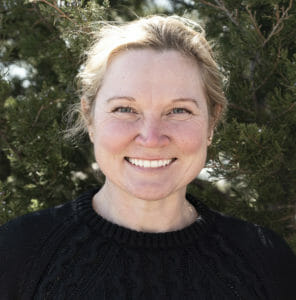
Martha McFarland joined the PFI staff in April 2022 as the farmland viability coordinator. In this role, she supports land seekers and landowners with land access and farm transition assistance and resources. Martha has been a farmer member of PFI since 2014.
Martha also runs Hawkeye Buffalo & Cattle Ranch near Fredericksburg, Iowa, where she manages grazing on woods and pasture, raises oats and hay and works with a tenant who raises corn and soybeans. Her experience with her farm’s transition and her love of the Iowa landscape inspired her to help the next generation of farmers and landowners.
Prior to running the ranch, Martha spent 10 years working in education and mentoring beginning teachers. Martha serves on the Minnesota Bison Association’s board of directors, is a member of the Iowa Cattlemen’s Association and is a mentor and facilitator for the Women, Food and Agriculture Network. She holds a Master of Education from Colorado State University.
Martha also loves yoga, writing, early morning coffee on the back porch and traveling to the cities to explore new restaurants.
Have You Read Our FY2021 Annual Report?
Members should have received a copy of our 2021 annual report in the mail (if you haven’t, please contact Debra at (515) 232-5661 or debra@practicalfarmers.org to make sure your membership details are current!). 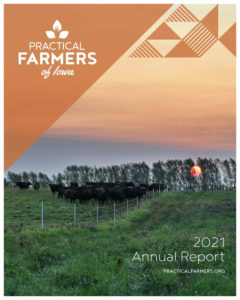
For those who wish to share the link with others, the report is online as well. Inside, you’ll read about the reach of our cover crop and small grains cost-share programs; how our recent organizational restructure is setting us up for long-term success; how our farmer-led education work is touching hundreds of farmers; and more.
Our annual report is filled with stories about our members, and offers an excellent overview of our programs, financials and what we accomplished together last year.
If you know someone who’s not yet a member of PFI but could benefit from our community, our annual report is a perfect place to start – please consider sharing it with them.
Find it online here, or contact the office to request additional hard copies in the mail.
Forging New Boundaries for Livestock Farmers
Meghan Filbert says farewell to PFI as she takes new path in grazing world
Eight years ago, on a remote island in Scotland, I was taking a break from tending sheep in damp moorland. I opened my laptop to read PFI’s Practical News and saw that PFI was hiring a livestock coordinator. It was in that moment I knew that I was going to move back to my home state of Iowa and work for Practical Farmers of Iowa, an organization I had been admiring for many years. I wanted Iowa to grow more grass, bring livestock back on the land and bring families back to the farm.
While I knew the job would be centered around working with livestock farmers, what I didn’t know was how much I’d learn about community. PFI’s members and staff, who radiate honorable visions and values on a daily basis, taught me what being part of a community truly means. I am grateful to carry this deep understanding and support network with me to the next stage of my life and in my career.
The pinnacle of my time at Practical Farmers was getting to create a film, alongside my friends and colleagues, that explores livestock’s role in thriving rural communities. “Livestock on the Land” pays tribute to PFI’s roots while showcasing some of the finest folks in our state – and then went on to win awards. What a joy!
I am also proud that my final project was the initiation of our new grazing infrastructure cost-share program, which we hope to sustain for years to come. Through the initial round, 18 farmers were each awarded $5,000 to invest in mobile fence and water to increase the number of acres regeneratively grazed in Iowa.
My next career move will be focused on spearheading the adoption of virtual livestock fencing in North America – a technology I’ve grown passionate about over the last five years (as many of you can attest to!). Starting this summer, my husband and I will be using collars on our small ruminants to graze and reconstruct oak savannas as silvopastures. Not having to pull electronet through the woods on a humid August morning is becoming a reality!
We’ll be hosting field days on our farm in the coming years demonstrating the virtual fence technology and agroforestry practices.
I’m honored to have supported the PFI mission to build resilient farms and communities by helping farmers bring livestock back on the land.
All my best,
Meghan Filbert
Organizing for a Just and Equitable Food System
Celize Christy bids PFI farewell as she moves on to HEAL Food Alliance
When I returned to Iowa in 2018, it felt like a homecoming to return to the place where my agriculture journey began. It has been an honor to serve PFI members, partners and the greater food and farming community. During my tenure at PFI, I have had the chance to work with innovative livestock producers and support the next generation of farmers.
Most recently, I have worked on efforts to meet the board’s vision of expanding our big tent by welcoming farmers of color through our Spanish-language programming and by hosting exclusive spaces for farmers of color to be in healing community with one another.
After our 2022 annual conference, each staff member takes the time to read through each evaluation submitted. As I read through this year’s evaluations, about a third of respondents requested to see more topics focusing on farmer of color in the future – affirming that PFI’s efforts at inclusion is both profound and crucial.
As an avid connector and advocate for farmers of color, I am looking forward to continuing my passion of building a more equitable and just food system as an organizer for HEAL Food Alliance. I will always carry forward the heart of PFI’s farmer-led ethos and its values of curiosity, creativity, collaboration and community.
With the deepest appreciation and gratitude, thank you for all the work you do each day to practice an agriculture that inspires positive change towards a diverse and vibrant Iandscape.
In solidary and community,
Celize Christy

